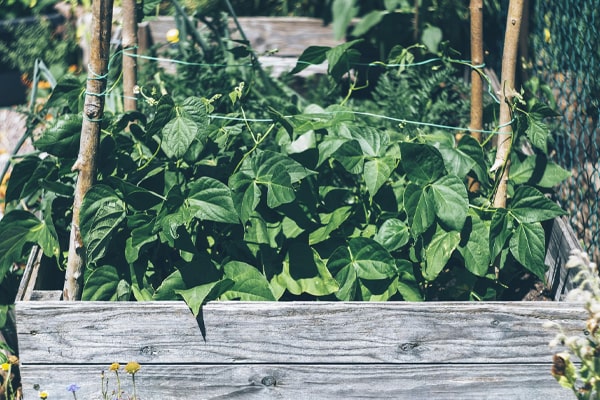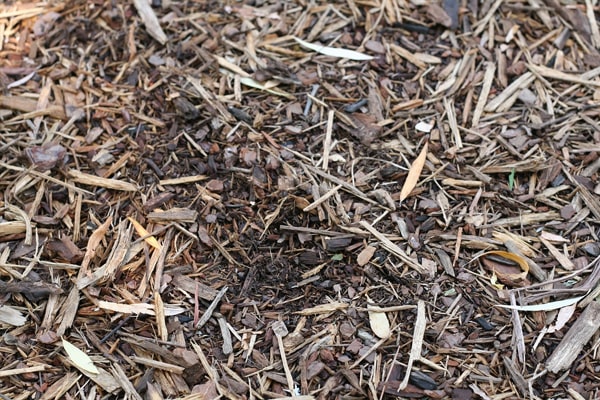Weeds are unwanted plants that compete with desired plants for nutrients, water, and sunlight. If left unchecked, weeds can quickly overwhelm a garden, choking out the plants you intentionally planted.
Competing with nutrients weakens or even kills plants, leading to poor yields and an unsightly garden. Eliminating weeds is crucial for maintaining a healthy garden.
Besides competing for nutrients, weeds can harbor pests and diseases. Removing weeds creates a more hospitable environment for your plants to grow, ensuring they have access to the resources they need to thrive.
Weed control is fundamental to successful gardening. It promotes stronger, more productive plants and visually appealing outdoor space. And this can be done naturally. In this guide, let’s take a look at the many ways to control weeds without using herbicides and other harmful chemicals:
Contents []
The Dangers of Chemical Weed Control
Chemical weed control, while seemingly convenient, poses significant dangers to both the environment and human health. These chemicals, called herbicides, are designed to kill or inhibit the growth of weeds. But herbicides do not discriminate – they kill beneficial plants along with entire ecosystems and some beneficial animals.
One of the primary concerns with chemical weed control is its impact on the environment.
Herbicides can leach into the soil, contaminating groundwater and harming aquatic life. Runoff from treated areas can pollute nearby waterways. This leads to ecosystem imbalances and the decline of biodiversity.
On top of all that, chemical residues remain in the environment for a long time, accumulating in the food chain and posing risks to wildlife and humans.
Direct contact with these chemicals can cause skin irritation, respiratory issues, and even more severe illnesses with prolonged or high-level exposure.
The overreliance on chemical weed control can contribute to developing herbicide-resistant weeds.
As weeds are repeatedly exposed to the same chemicals, some develop genetic mutations that enable them to survive and reproduce, leading to chemical-resistant weeds. These are weeds that no longer respond to chemical treatments.
Fortunately, there are safer, more sustainable alternatives to herbicides.
These include:
- Manual methods such as hand pulling or hoeing weeds
- Mulching to suppress weed growth
- Using organic weed control products derived from natural sources.
Combining different weed control strategies can effectively manage weeds while minimizing the use of harmful chemicals.
Natural Weed Control Methods to Implement in Your Garden

Natural weed control methods are essential for maintaining a healthy and vibrant garden without resorting to harmful chemicals. By implementing these strategies, you can effectively manage weeds while promoting the overall health of your garden and surrounding environment.
Improve Soil Health
Healthy soil is the foundation of a weed-resistant garden. How?
Improving soil health helps deter weeds by creating an environment where desired plants thrive, leaving less space and resources for weeds to grow. Healthy soil, rich in nutrients and organic matter, supports strong root growth in desired plants, making it harder for weeds to establish themselves.
Additionally, well-structured soil retains moisture better, reducing the stress on desired plants and giving them a competitive edge over weeds.
By nurturing healthy soil through practices like adding compost or aged manure and avoiding compacting it, gardeners can create conditions that discourage weed growth naturally. This approach minimizes the need for chemical weed control methods and promotes a sustainable, thriving garden ecosystem.
Grow Beneficial Grass
Growing a mix of grass species in your lawn can help suppress weed growth naturally. Dense, healthy grass outcompetes weeds for sunlight, water, and nutrients, reducing their ability to establish and spread. Thick grass crowds out weed seedlings, preventing them from establishing and spreading.
Choose grass varieties that are well-suited to your climate and soil conditions. This makes the lawn easier to maintain. By providing proper care, such as regular mowing and watering, you can promote strong grass growth and suppress weed growth naturally.
Proper Hydration
Proper hydration for your plants ensures they grow strong and compete well with weeds. By watering deeply and infrequently, you encourage deep root growth in your plants, making them more resilient to drought and better able to outcompete weeds.
Adequate hydration also helps maintain soil moisture levels, preventing weed seeds from germinating and establishing themselves.
Avoiding overhead watering methods further reduces the chance of weed growth by not distributing weed seeds across the soil surface.
Prepare the Flower Beds

Preparing flower beds deters weeds by creating an environment where desired plants can flourish and outcompete weeds.
Start by removing existing weeds using a weeder to pull their roots from the soil. Then, remove any debris and loosen the soil with a garden fork or hoe. Incorporate compost or other organic matter to improve soil fertility and structure. Plant your desired flowers closely together to create a dense canopy that shades the soil, limiting weed growth.
Avoid Contamination to Prevent Weed Spread
Prevent the growth and spread of weeds by avoiding contaminated soil, mulch, or plant material. Check any new plants or soil amendments for signs of weeds before introducing them to your garden. Be cautious with mulch, ensuring it’s weed-free before applying it to your garden beds.
Clean gardening tools and equipment regularly to prevent the accidental spread of weed seeds between areas of your garden. Weed seeds tend to cling to clothes, so always check your clothing and shoes when crossing the garden area.
Improve Lawn Health
A healthy lawn is an effective barrier against weeds. Mow your grass regularly at the right height to encourage thick grass growth, which naturally suppresses weeds.
Avoid cutting the grass too short, as this weakens the plants and makes them vulnerable to weed invasion. Aerating the lawn and overseeding bare patches helps thicken the turf, leaving less space for weeds to take hold.
Use Organic Mulch

Using organic mulch effectively prevents weed spread by creating a barrier that blocks sunlight and smothers weed seeds. If the conditions are unfavorable for weeds, they will not thrive.
Apply a thick layer of mulch around your plants to cover the soil surface and inhibit weed growth. Organic mulches, such as shredded bark or straw, also improve soil moisture retention and add nutrients to the soil as they decompose, promoting the health of your desired plants.
Replenish the mulch to maintain adequate coverage and weed suppression throughout the growing season.
Natural Solutions for Weeds
Natural chemicals offer effective alternatives for preventing weeds without resorting to harmful synthetic herbicides.
- Vinegar, a common household item, contains acetic acid, which can kill weeds. This chemical works by disrupting weeds’ cell membranes. Simply spray undiluted vinegar on weeds on a sunny day to effectively wilt and kill them.
- Neem oil, derived from the neem tree, contains compounds that inhibit weed seed germination and growth. Dilute neem oil with water and apply it to the soil surface or directly on weeds to suppress their growth without harming desired plants.
- Corn Gluten Meal, a byproduct of corn processing, acts as a pre-emergent herbicide, preventing weed seeds from germinating. Spread corn gluten meal evenly over soil surfaces in early spring before weed seeds sprout.
As it breaks down, corn gluten meal releases proteins that inhibit root development in weed seeds, effectively preventing them from growing into mature plants.
These natural solutions are safe for use around children, pets, and beneficial insects, making them an eco-friendly option for weed control in gardens, landscapes, lawns, driveways, and pathways.
Don’t leave weeds unchecked. There are natural alternatives to control weeds. Going the all-natural route helps maintain a healthy garden without harming the environment or human health.



